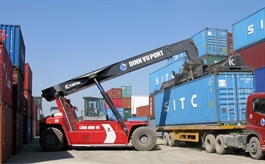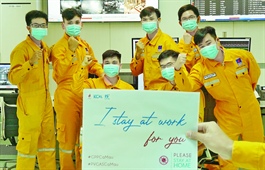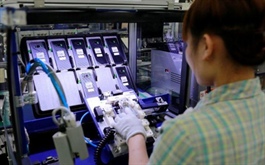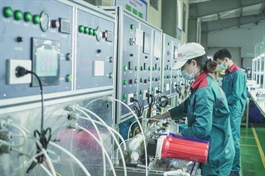Corporates seek more flexibility in COVID-prevention measures
Corporates seek more flexibility in COVID-prevention measures
Business executives have called on the Government to issue “resolute but flexible” prevention measures to help them survive the COVID-19 pandemic and keep the economy afloat.

Speaking last week at a meeting held to discuss ‘Sustainable Production during the Pandemic: Problems and Solutions,’ Vu Tien Loc, chairman of the Viet Nam Chamber of Commerce and Industry, said businesses were facing unprecedented challenges from the current wave of pandemic.
“The challenges include significant drops in demand [and] revenues, and lack of funds to keep going.”
Many businesses wanted the Government to address the problems related to the movement of goods, provide vaccines for manufacturing workers and roll out preferential policies to reduce their costs and taxes, he said.
It was important to simplify the procedures for disbursing its VND26-trillion (US$1.13 billion) support package meant for individuals and businesses affected by the pandemic, he said.
“Other recommendations are interest rate reduction and debt payment rescheduling, and support for businesses to retain their workers.”
Banks should cut loan interest rates and create favourable conditions for businesses to borrow, he said.
“Improving the business environment and promoting public investment are also needed to support businesses and the economy.”
Vu Duc Giang, president of the Viet Nam Textile and Apparel Association, said the industry’s exports topped $22.86 billion in the first seven months, up 50.22 per cent year-on-year, to surpass Bangladesh and rank second only behind China.
Since the fourth outbreak began in April textile and garment enterprises were facing huge challenges due to the social distancing under Directive 16 while the entire production system in the 19 southern provinces had been disrupted, he said.
“Disruption in the supply chain, consumption and exports are a major hurdle.”
A number of cities and provinces failed to apply Directive 16 in a flexible manner, he said, pointing out that for instance all businesses, including those without infected workers, still had to close.
Others were those related to goods circulation and delivery across the country due to inconsistency in prevention measures adopted by various localities, he said.
“The stringent restrictions on movements make it extremely challenging for companies to sustain production, especially specialised units.”
The Government should provide more specific guidance on how to implement Directive 16 in a flexible manner so that businesses that do not have infected employees could continue to function, he said.
Vaccination priority should be given to textile enterprises since less than 1 per cent of their workforce had been immunised so far, he added.
Ly Kim Chi, chairwoman of the HCM City Food and Foodstuff Association, said having workers live in the workplace is “not working well and should be stopped so that production can be restored to meet consumer demand.”
She pointed out it was only a temporary measure for two to three weeks for medium-sized enterprises and four to five weeks for large enterprises.
“Essential food makers have to bear too many costs, including for weekly COVID testing, workers’ board and lodging at the workplace and overtime payment among others.”
Many wanted two-thirds of their employees working at their factory and going home directly after work and nowhere else, and staff to buy food for them, she said.
Others wanted half their workforce to work at the factory for 15 days, be furloughed for a week, and be tested before re-entering the factory afterwards, she said.
The city should assist food firms with carrying out medical screening and surveillance at factories and workers’ homes, she said.
“The city should give priority to vaccinating workers at factories that are required to keep production going such as those in the medical and food production sectors.”
Dr Nguyen Dinh Cung, a former director of the Central Institute for Economic Management, said it was important to redefine “essential products” since currently the Government only treated food and medicine as such.
The fourth outbreak was worse than the previous ones, and many businesses might not be able to survive it, he warned.
“The Government should have a comprehensive economic recovery programme, with solutions to stimulate the economy. We need to have a longer-term solution to enable businesses to recover.”
Gov’t promises to assist businesses
Speaking at a recent meeting with business representatives from across the country, PM Pham Minh Chinh promised continued support for those affected by the pandemic, and encouraged everyone to stay positive and “strong.”
Despite the outbreak, businesses had done well to keep their employees safe and keep production chains intact, he said.
He emphasised that the goals were to prevent a medical or economic crisis, ensure public safety and bring life back to normal by no later than the beginning of next year.
But for now all preventive measures, especially social distancing, must be strictly complied with to tackle the highly contagious Delta variant, he warned.
“We are willing to sacrifice a few months to have more safe zones, and to sacrifice our needs for peace and health.”
























